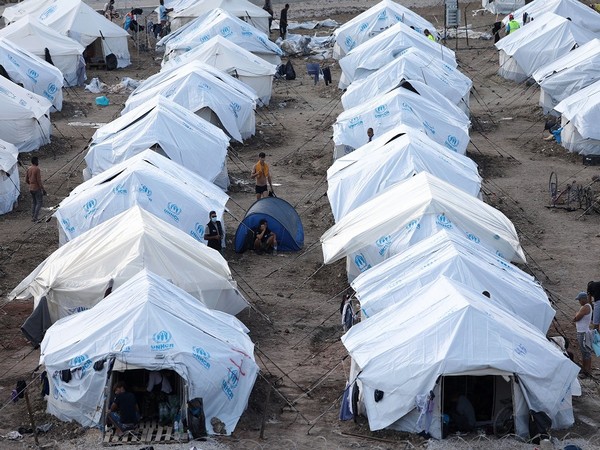Venezuelan migrants face higher risk of pandemic eviction
The survey, by the Inter-American Commission on Human Rights (IACHR), United Nations agencies and a clutch of charities, was based on 1,220 interviews with migrant households in seven Latin American countries. It showed that 11% of all renter evictions led to homelessness, while three out of four Venezuelans had no place to call home once evicted, raising the risk of COVID-19 infections among Venezuelans living on the street.

- Country:
- Venezuela Rb
By Anastasia Moloney BOGOTA, Feb 17 (Thomson Reuters Foundation) - Two in five Venezuelans who sought refuge in nearby Latin American countries have been evicted in the pandemic, according to a survey released on Wednesday that showed migrants run a higher risk of homelessness than other renters.
The collapse of Venezuela's economy and shortages of food and medicine have forced about 5 million Venezuelans to flee their homeland in recent years, including to neighboring Colombia where nearly 2 million migrants have settled. The survey, by the Inter-American Commission on Human Rights (IACHR), United Nations agencies and a clutch of charities, was based on 1,220 interviews with migrant households in seven Latin American countries.
It showed that 11% of all renter evictions led to homelessness, while three out of four Venezuelans had no place to call home once evicted, raising the risk of COVID-19 infections among Venezuelans living on the street. "Evictions affect the economic and social human rights of migrants, refugees and displaced persons and, in the current context, mainly the access to decent housing for Venezuelans," Julissa Mantilla, a commissioner for the IACHR, the Americas human rights body, said in a statement.
Even among those who find a new place to live, the survey said three out of ten risk a second eviction, with one in five of those affected either pregnant or a new mother. Having lost jobs due to the pandemic, many Venezuelans live in poverty and depend on the informal economy for survival - selling food, cleaning windscreens or begging across the region.
Half of the households interviewed lived in a single room and many were unable to pay their rent, the survey said. Undocumented Venezuelans and those migrants with irregular status are most at risk of eviction, it said.
"Public policies to promote access to adequate housing need to be guaranteed," said Eduardo Stein, a special representative for refugees and migrants from Venezuela at the U.N. Aid groups have received reports from Venezuelans about threats, violence and interference by landlords, ranging from sexual harassment to disconnected utilities, the report said.
Some governments in Latin America have introduced temporary bans on evictions and provided alternative shelters, including hotel accommodation, during the pandemic, the report noted. But some of these measures have already expired or else will end with the COVID-19 health emergency, leading to a "possible spike" in evictions, the report warned.
This month, Colombia announced it would give temporary protection to Venezuelan migrants - a move that gives nearly a million Venezuelans the right to work in the country. The report was compiled by the Regional Protection Sector that includes various U.N. agencies, along with 106 humanitarian groups that help Venezuelans on a platform called "Response for Venezuelans' (R4V).
(This story has not been edited by Devdiscourse staff and is auto-generated from a syndicated feed.)
ALSO READ
UPDATE 2-Colombia's central bank shocks with 100-bp rate hike to 10.25%
India sees Arab world as gateway to Europe, Africa, Latin America: Minister
Colombia's constitutional court provisionally suspends economic emergency decreed in December
UPDATE 1-Colombian court pauses Petro's economic emergency measures
Tragedy in the Skies: Colombian Plane Crash Leaves No Survivors










